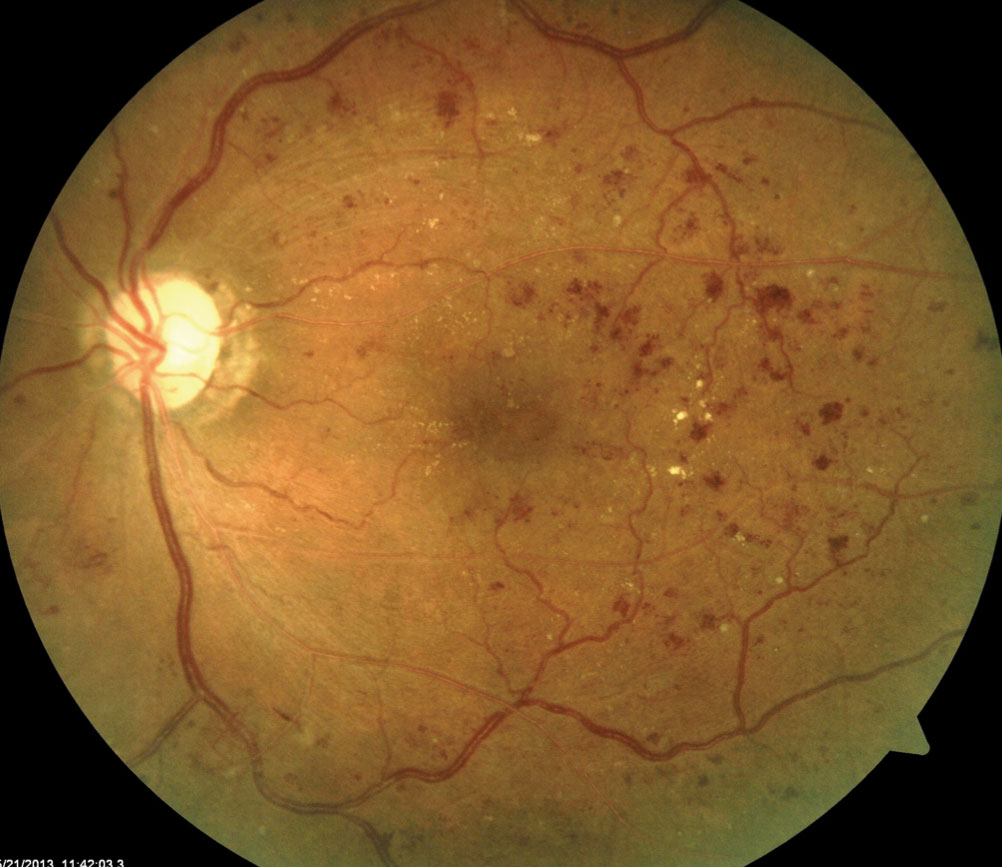 |
Patients with DR may have a heightened risk of cognitive impairment. Click image to enlarge. |
Current research supports the notion that vascular insufficiency and neurodegeneration both contribute to an increased risk of cognitive impairment in patients with diabetes. Because the retina is a brain-derived tissue, its examination may act as an easily accessible and less invasive way to screen for cerebral structural abnormalities or cognitive decline in diabetic patients. Findings from a recent study found that diabetic retinopathy (DR) was associated with both structural abnormalities in the brain and cognitive impairment, even after adjusting for glycemia, hemoglobin A1c levels and hypertension.
The meta-analysis looked at 27 studies from several electronic databases that assessed the association between DR and cerebral small vessel disease or cognitive impairment in a diabetic cohort. Two investigators independently screened and gathered data from the articles to include in the review, which involved four analyses examining the association between DR and brain structural abnormalities, as well as DR and cognitive impairment.
They calculated a combined odds ratio of 1.75 for the association between DR and cerebral structural change from five studies. The association between DR and cognitive impairment events had an odds ratio of 1.47 based on a combined hazard ratio from four studies; when they reviewed 14 different studies, this odds ratio was similar at 1.43.
“The present meta-analysis suggests that DR is associated with an increased risk of structural abnormalities in the brain and cognitive impairment,” the researchers wrote in their paper. “This association remained significant after adjusting for blood glucose levels, hemoglobin A1c and the presence of hypertension. Furthermore, DR and cognitive impairment showed a significant positive correlation in studies employing multiple linear regression analysis.” They cited a supporting study that concluded “associations between any retinopathy and imaging abnormalities were stronger in persons with diabetes than in those without.”
The analysis did not find a relationship between DR and dementia. Though many of the cohort studies suggested that the dual presence of DR and cognitive impairment could predict dementia risk, the cross-sectional studies overall did not form this observation.
“The contradiction between cohort and cross-sectional studies may have resulted from the average age of the patients. We believe that the outcome of the cohort studies is more reliable because we can draw causal inferences strictly from cohort studies,” the researchers explained.
In conclusion, the literature review finds that the presence of DR may signal a potential risk for cerebral disease and compromised cognition. Additional research may help to solidify DR screening as a way to evaluate these conditions in patients with diabetes.
Chai YH, Zhang YP, Qiao YS, et al. Association between diabetic retinopathy, brain structural abnormalities and cognitive impairment for accumulated evidence in observational studies. Am J Ophthalmol. January 10, 2022. [Epub ahead of print]. |

